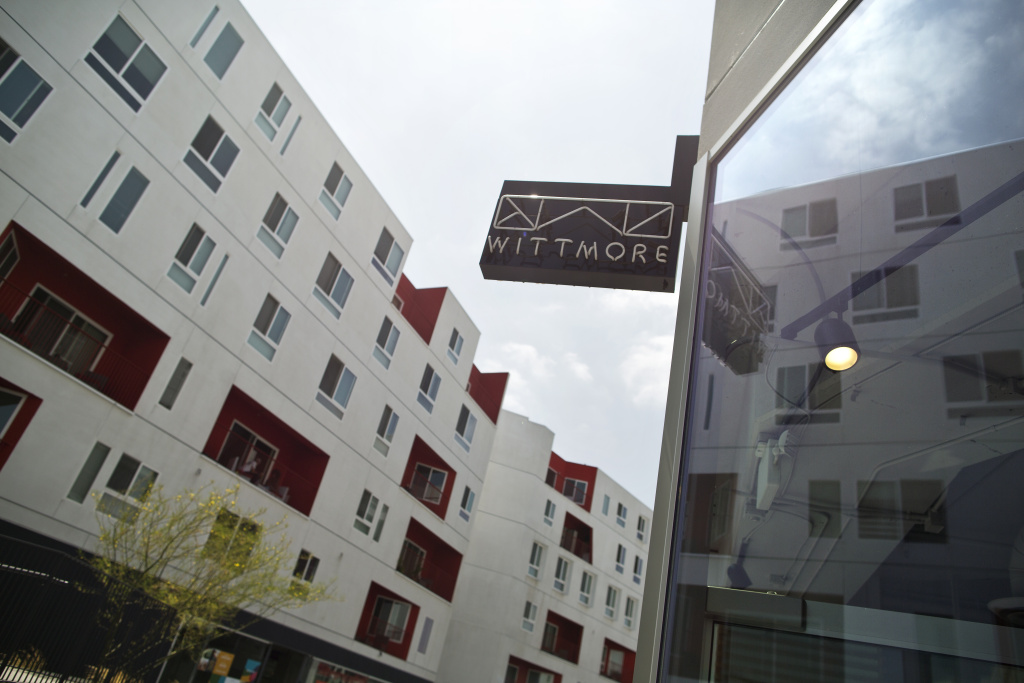Tenant activists divided over LA housing measure

 The One Santa Fe complex in the Arts District includes affordable housing. MAYA SUGARMAN/KPCC
The One Santa Fe complex in the Arts District includes affordable housing. MAYA SUGARMAN/KPCC
^play
By: Josie Huang
Next month, L.A. voters will decide if more of the city’s housing developers should be required to designate some units in their future buildings for lower-income tenants.
The initiative, known as Measure JJJ, requires developers to set aside between 11 and 20 percent of their units as “affordable housing” on apartment buildings in L.A. that exceed the city’s zoning code.
But for one group of tenant activists, Measure JJJ doesn’t go far enough.
The L.A. Tenants Union has split from other renters’ rights groups in its opposition to the initiative, saying it only creates a clearer path for developers to build luxury projects for the rich.
“It’s going to displace and hurt more people than it’s going to help,” said Elizabeth Blaney, a member of the tenants union and co-director of community group Union de Vecinos in Boyle Heights.
The tenants union formed last year by renters concerned about mass evictions and the demolition of rent-stabilized buildings. It is typically at odds with developers. But it’s joined with them and the L.A. Chamber of Commerce in fighting Measure JJJ. (The business community says JJJ’s hiring and wage requirements will make building costs rise.)
Meanwhile, other tenant rights groups back the measure. The Coalition for Economic Survival and Strategic Actions for a Just Economy are urging their members to vote for JJJ. Cynthia Strathmann, the group’s executive director, said the measure is not a silver bullet, but it’s an improvement over the status quo.
“If we don’t pass JJJ, what we will have is more of what we’ve got now, and more of what we got now has clearly led us to a crisis point,” Strathmann said.
JJJ’s chief architects are labor unions and affordable housing advocates. Laura Raymond, a member of the Build Better LA Coalition and campaign director for the Alliance for Community Transit-Los Angeles, said that the group has tried to make its case to the tenants union.
“We’re absolutely supportive of tenant rights, so it’s disappointing that they’re seeing this in a different light,” Raymond said. “But at the end of the day, not building and not developing in L.A. is not really an option.”
Blaney, of the tenant’s union, said she also worries that the measure will spur on new developments, which will mean the demolition of older rent-regulated buildings to make way for them.
“You have to look at who’s lived there before, and who got pushed out as to whether or not it’s just a shuffling of people as opposed to really doing anything to really address affordable housing,” Blaney said.
The tenants union said Measure JJJ should have included a provision that would give tenants right-of-return if displaced from their original apartment.
Strathmann agreed that such a provision would be “good policy,†but that Measure JJJ as it is, has “an awful lot in there.”
“I think to not support it because it doesn’t have every single thing that you want would be really short-sighted for a renter,” Strathmann said.
Another fight between the tenants union and fellow tenant activists is shaping up for the spring. That’s when a second development-related initiative will be on the March 2017 ballot. The Neighborhood Integrity Initiative strives to put a two-year ban on development in the city.
The tenants union has come out in support of that measure — the other groups are against it.
